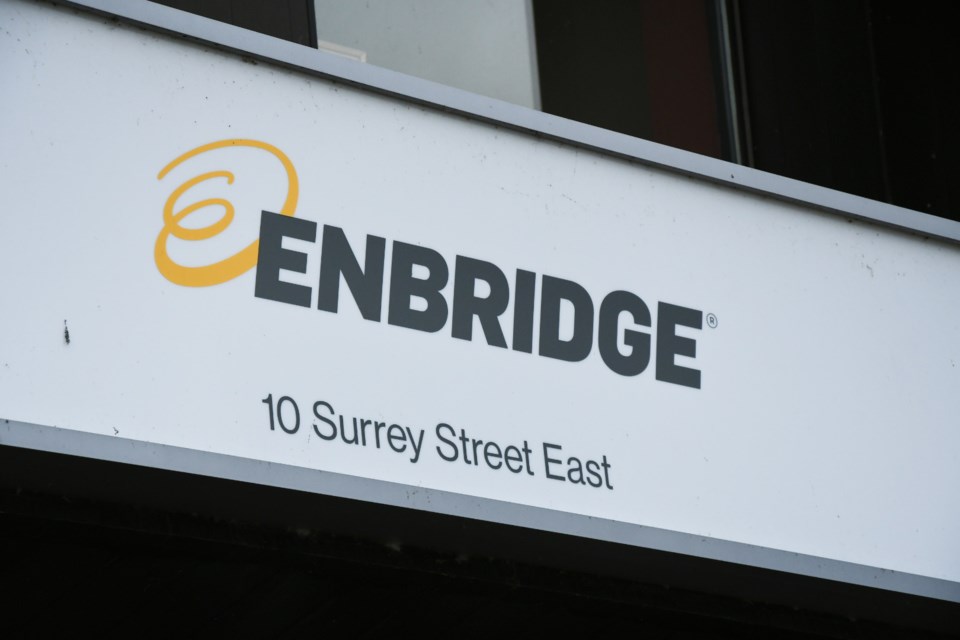As the city’s contract with Enbridge gas nears its end, city council is looking for more than a status quo renewal and is calling on the provincial government to allow new fees to be collected.
Motions approved by council’s committee of the whole on Tuesday would see city staff negotiate new fees from the utility company in line with what other jurisdictions in Canada charge, as well as have it pay for relocating lines when there’s conflict with city infrastructure, without passing the cost on to customers.
However, provincial legislation currently prohibits cities from charging gas companies to run their delivery pipes below municipal roads and rights of way – something the committee is asking to be changed.
“We’re at the leading edge of change here,” Coun. Leanne Caron said in introducing the motions, supported by Coun. Rodrigo Goller, which are similar to ones passed in Toronto and Ottawa. “Obsolete regulations for an obsolete way of thinking need to change and I have no confidence that Enbridge will voluntarily renegotiate a signed agreement because there’s benefit (for it) to do so.”
Tuesday’s committee decision was approved 11-2, with councillors Christine Billings and Dan Gibson in opposition.
“When there is new legislative impacts on that industry, it is accounted for at the next rate review,” Gibson said. “This will directly impact ratepayers in our city, not today but when the next rate review happens.
“We believe we’re making new revenue streams at the municipality. Really we’re passing those fees onto the ratepayers. That’s how it works in Ontario.”
The committee’s motions will now go to the formal council meeting on Nov. 26 for potential ratification. If approved at that time, the motion would be put into action.
A 20-year agreement between Enbridge and the City of Guelph allowing the use of municipal easements is set to expire next spring. With existing legislation as its guide, city staff recommended the contract be renewed largely as-is.
That was defeated 10-3, with Mayor Cam Guthrie joining with Billings and Gibson.
Ahead of voting, the committee heard from a number of delegates who encouraged council to take a stand against ‘subsidies’ for fossil fuel companies and call for provincial changes.
“Maintaining our current franchise agreement with Enbridge is both unsustainable and unjust,” stated 17-year-old Abigail Walton of Youth Climate Anxiety and Climate Action. “If we continue to subsidize Enbridge, we will have to work overtime to compensate for greenhouse gas emissions that we could have prevented by ending our endorsement of this company.”
“Land is a precious thing. Don’t give it to a fossil fuel company for free,” added fellow group member Indigo Moran.
Council also heard from two members of Seniors for Climate Action NOW!, with others sitting in the gallery.
“Subsidizing Enbridge, while proposing significant cuts to environmental investments, as are proposed in Guelph’s 2025 budget, are not consistent with building a healthy environment,” said Gina Lammel.
“As higher-income consumers shift to cleaner technologies, lower-income Guelph citizens unable to make the transition will end up paying more and more to fund Enbridge’s fossil gas system.
“Those left to pay will be those who are least able to pay.”
Nobody from Enbridge delegated to the committee or submitted written comments for the committee’s consideration.
Prior to the start of the public session, council met behind closed doors for about 30 minutes to discuss the Enbridge contract with the city’s legal staff.
On Monday, MPP Mike Schreiner introduced the “No Free Ride for Fossil Fuels Act” at Queen’s Park, seeking legislative change to allow municipalities or local boards the ability to impose fees on gas producers, distributors, transmitters and storage companies.
“It's time for Enbridge to start paying their fair share to run their pipes through public ground,” Schreiner said in a social media post. “Our municipalities are struggling with homelessness, aging infrastructure, and underfunded social services – they can't afford to give a subsidy to Enbridge on top of that.”
Though it received first reading, the bill has a long way to go before it could become law. Following second reading, if it passes, the bill would go out to a committee for consideration and amendment, after which it would return to the house for third reading.
If it passes at that stage, it will receive royal assent, which is when it’s officially signed into law.
Tuesday’s committee-approved motion includes support “in principle” for Schreiner’s bill.
